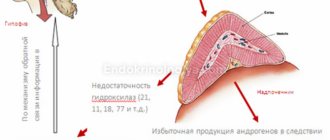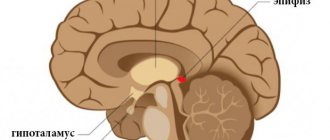Adrenal hormones
The adrenal glands are small paired glands of the endocrine system located above the upper poles of the kidneys. They consist of an outer layer called the cortex and an inner part called the medulla. Each part is an independent endocrine gland that has its own functions. Their common task is the production of hormones, substances that regulate all vital processes in the body. For example, adrenaline (one of the hormones in the medulla) provides a reaction to sudden danger or pain. When it occurs, the release of adrenaline into the blood mobilizes carbohydrate reserves for the rapid release of energy (increased muscle strength) and causes constriction of peripheral blood vessels and dilation of the pupils. Thus, the body quickly receives reserve forces for “flight or fight” and at the same time an effective mechanism for reducing blood loss, thanks to vasoconstriction and rapid blood clotting. Adrenaline also stimulates the production of ACTH (adrenocorticotropic hormone), which, in turn, causes a sharp release of cortisol by the adrenal cortex. At the same time, the conversion of proteins into glucose increases, which is necessary to replenish glycogen reserves in the liver and muscles used during the anxiety reaction.
DHEA-S (Dehydroepiandrosterone sulfate) is an androgen, a male sex hormone that is present in the blood of both men and women. It plays an important role in the development of secondary male sexual characteristics at puberty and can be converted by the body into the more potent androgens (testosterone and androstenedione) as well as the female sex hormone estrogen. DHEA-S is produced by the adrenal cortex and its production is controlled by adrenocorticotropic hormone (ACTH).
Dehydroepiandrosterone sulfate is an informative marker of adrenal function. The analysis is prescribed to determine the causes of infertility in women, premature puberty in boys, diseases of the adrenal glands, and also to distinguish diseases associated with the adrenal glands from diseases caused by dysfunction of the ovaries and testicles.
Cortisol is a hormone that is produced in the adrenal cortex. Participates in the metabolism of proteins, fats, carbohydrates, in the development of stress reactions, regulates blood pressure levels.
As soon as we experience physical or psychological stress, the adrenal cortex begins to produce cortisol, which stimulates the heart and concentrates attention, helping the body cope with the negative effects of the external environment.
Cortisol production is regulated by adrenocorticotropic hormone (ACTH), which is produced by the pituitary gland, a small gland located at the bottom of the brain. The levels of ACTH and cortisol in the blood are regulated by a feedback method - when the concentration of cortisol decreases, the pituitary gland stimulates the production of ACTH, which in turn increases the production of cortisol until it returns to normal. An increase in the concentration of cortisol in the blood, on the contrary, leads to a decrease in the production of ACTH. Thus, the concentration of cortisol in the blood can change, both with an increase or decrease in the release of cortisol itself in the adrenal glands, and ACTH in the pituitary gland.
The study is prescribed as an indicator of the function of the adrenal cortex, for the diagnosis of endocrinological diseases (Itsenko-Cushing's disease and Addison's disease), to identify the reasons for the ineffectiveness of attempts to normalize high blood pressure, to assess the effectiveness of the treatment.
All prices, as well as a list of tests performed, can be found in the “Price List” section of the clinical laboratory. Blood can be donated for research daily (except Sundays) from 7.00 to 11.00. Strictly on an empty stomach.
Read also about Thyroid Hormones and Sex Hormones
1) Dehydroepiandrosterone sulfate
Dehydroepiandrosterone sulfate (DHEA-s, DEA-SO4) is a steroidal androgenic hormone synthesized by the adrenal cortex. It is used by the body to produce testosterone and estrogen. Its excess content can lead to the threat of termination of pregnancy and spontaneous miscarriage.
In what cases is a blood test for DHEA-s prescribed?
- adrenogenital syndrome;
- tumors of the adrenal cortex;
- ectopic ACTH-producing tumors;
- habitual miscarriage;
- fetal hypotrophy;
- delayed puberty;
- diagnosis of the state of the feto-placental complex from 12-15 weeks of pregnancy.
How to prepare for a blood test for DHEA-s?
Before donating blood, it is recommended to avoid stress and fatigue, limit physical activity, and refrain from frequent smoking. It is advisable to donate blood in the morning, on an empty stomach. If you need to donate blood at another time, you must abstain from eating for 4-6 hours.
What medications should not be taken before taking a blood test for DHEA-s?
Dexamethasone, hydrocortisone, prednisolone, diprospan, estrogens, oral contraceptives. When donating blood, you must inform the nurse about taking medications that affect the level of hormones in the blood.
What are the deadlines for completing the analysis?
1-2 business days.
What are the normal blood test for DHEA-s?
These values may vary depending on age, test systems and analyzers used:
- women: 810 – 8991 nmol/l;
- men: 3591 – 11907 nmol/l.
Testing in medical settings
The most common way to check how the adrenal glands are working is to donate saliva, which must be collected throughout the day. Samples will need to be collected at specific intervals over a 24-hour period. Each of these samples should be placed in a separate tube. Such material can give the therapist a complete picture of the functioning of the organs.
Testing for adrenal hormones can also be done during urine collection. This procedure should be performed throughout the day under the supervision of a specialist. Using this material, the doctor will determine in what quantities the adrenal glands produce certain enzymes. Such results are important, as they will help provide the doctor with a complete picture of the course of disorders in the functioning of organs.
Testing of the adrenal glands can also be carried out using special equipment. But such an event is quite expensive, and therefore it is rarely used in medicine today.
Aldosterone
Aldosterone is a hormone secreted by the zona glomerulosa of the adrenal cortex. Mineralocorticoids, which include aldosterone, perform very important functions in the human body - they are responsible for water-salt metabolism and provide regulation of hemodynamics. An increase in aldosterone in the blood leads to arterial hypertension, swelling in the arms and legs, cardiac dysfunction, and convulsions.
A blood test for aldosterone requires some preparation. Firstly, 14 days before the examination you should follow a special low-carbohydrate diet (you don’t have to limit yourself to salt). The day before the blood collection procedure, refrain from physical activity and try to avoid stress (these factors can lead to excess aldosterone, and, consequently, to false test results). The results of the study may be influenced by the use of oral contraceptives, synthetic hormones and drugs that lower blood pressure.
Features and moments of taking a hormone test
Women can take tests for the adrenal glands only during the period when they experience disruptions in menstruation, as well as when an increased amount of hair appears on the body. For men, an adrenal gland test can be performed with the following symptoms:
- Osteoporosis.
- With early puberty.
- When pigmentation appears on the skin. This usually happens in areas that are open or on mucous membranes.
- For muscle weakness.
- For acne.
- For hypertension.
- Losing body weight when there are no prerequisites for this.
Experts note that to conduct an analysis of the adrenal glands, you can choose a period when the adrenal glands are under the greatest load. This state will help to more accurately determine what processes are occurring there, and what disorders exist in the body and in the functioning of organs. When the amount of such an element is increased during tests for the adrenal glands, this means that the organs produce it in sufficient quantities, and also that it can enter the body from the outside. When hormones for the adrenal glands increase, the development of the disease can also be diagnosed based on the following factors:
- Dysfunction of the pituitary gland.
- When taking certain medications for a long time.
- When the body produces ACTH in large quantities
- For diseases of the adrenal glands.
What does a blood test for progesterone show?
The analysis allows you to determine the level of the hormone produced by the corpus luteum of the ovaries. It is he who is responsible for preparing the endometrium for egg implantation and successfully carrying a baby.
It is considered justified to order an examination at INVITRO if:
- menstrual irregularities;
- problems with conception;
- uterine bleeding;
- post-term pregnancy.
With the help of an examination, it is possible to determine the condition of the placenta in the 2nd and 3rd trimester.
Progesterone levels during pregnancy
After fertilization, a rapid increase in the amount of the hormone is observed, this occurs up to 15-16 weeks. Further, the indicator stabilizes somewhat and grows less intensively.
Norm by week
| Week of pregnancy | Normal value (ng/ml) |
| 1-2 | 12-18,2 |
| 5-6 | 18,6-21,7 |
| 7-8 | 20,3-23,5 |
| 9-10 | 23-27,6 |
| 11-12 | 29-34,5 |
| 13-14 | 30,2-40 |
| 15-16 | 39-55,7 |
| 17-18 | 34,5-59,5 |
| 19-20 | 38,2-59,1 |
| 21-22 | 44,2-69,2 |
| 23-24 | 59,3-77,6 |
| 25-26 | 62-87,3 |
| 27-28 | 79-107,2 |
| 29-30 | 85-102,4 |
| 31-32 | 101,5-126,6 |
| 33-34 | 105,7-119,9 |
| 35-36 | 112-124 |
| 37-38 | 219 |
| 39-40 | 273 |
Deviation can cause problems with bearing a child.
Low progesterone during pregnancy
A decrease in hormone levels can cause:
- spontaneous abortion;
- embryo development disorders;
- post-maturity;
- weakness of placenta functions;
- freezing of the fetus.
Increased progesterone during pregnancy
A pathological increase in the amount of the hormone during pregnancy may indicate:
- dysfunction of the placenta;
- kidney disorders;
- increased blood glucose;
- ovarian cyst.
Where to get tested
The network of medical centers and laboratory terminals of SZTsDM JSC covers St. Petersburg, Novgorod, the Leningrad region, Kaliningrad, Pskov.
To find the branch closest to you, use the drop-down menu on the top bar, interactive map or table. In the menu and on the map, you can click on the selected object - and you will receive complete information about the location, hours and days of reception. The map can be opened in YandexMaps to conveniently calculate the route.
In any department you will be greeted by qualified and attentive staff, sterile cleanliness, and you will be provided with a modern level of service and diagnostics.
We invite you to undergo research on the level of adrenal hormones at SZTSDM!
Remember that early detection of a problem is the key to complete and rapid success in identifying it. Be healthy!
The laboratory of JSC "SZTsDM" offers services that provide comprehensive and consistent laboratory examination of the patient
Diagnostics Medical professionals conduct high-quality diagnostic studies of the whole body
Treatment Our medical centers are focused on serving patients on an outpatient basis and are united by a unified approach to the examination and treatment of patients.
Rehabilitation Rehabilitation is actions aimed at comprehensive assistance to a sick person or disabled person so that he can achieve the highest possible usefulness, including social or economic.
Home visit Attention! There is a promotion “Home visit - 0 rubles”
Medical examinations of JSC "SZTsDM" conducts preventive examinations of employees, which include a set of therapeutic and preventive measures carried out to identify deviations in the state of health, prevent the development and spread of diseases.
source









